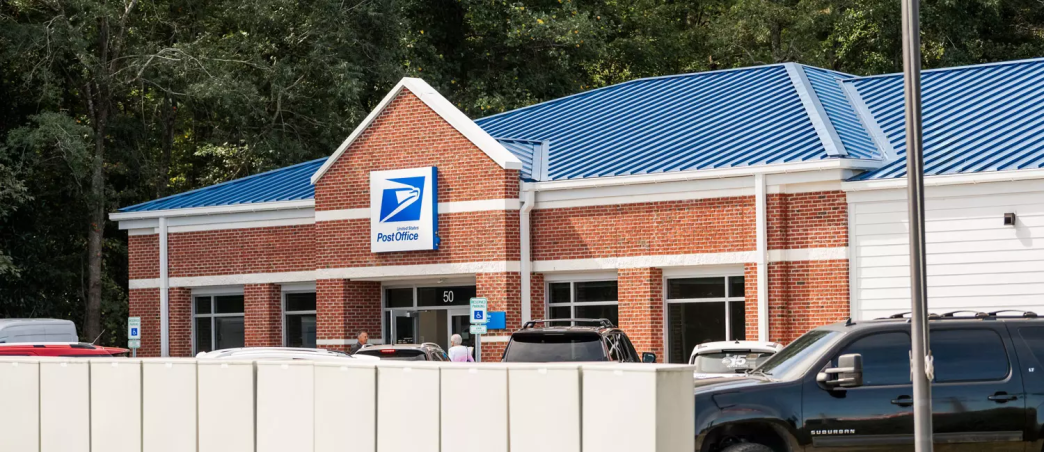United States Postal Service has recorded $87 billion in financial losses over the past 14 years and struggles with chronic underinvestment in infrastructure. Against this backdrop, the rebuilding of the Longs, South Carolina, post office represents a potential model for addressing America’s postal infrastructure crisis.
With 99% of the U.S. population living within 10 miles of a post office, these facilities represent one of the nation’s most extensive public infrastructure networks. USPS delivers nearly half of global mail volume, serving more than 160 million addresses across the country. But years of financial strain have left many facilities outdated or in disrepair, contributing to service delivery challenges that were further exposed during the COVID-19 pandemic.
However, through private capital investment from American Infrastructure Partners, a small community post office in Longs has transformed a devastating setback into an opportunity for modernization, offering insights into how public-private partnerships can effectively address USPS’ infrastructure challenges where government planning falls short.
A Case Study in Recovery
When an arson fire destroyed the Longs post office, it ravaged a vital community lifeline. In many rural communities like Longs, post offices serve as essential hubs for communication, commerce, and social interaction.
The destruction of this facility threatened to create a significant service gap in a system where consistent access to postal services is considered fundamental.
American Infrastructure Partners, through its American Postal Infrastructure fund, decided to finance a restoration of the building. The firm, which currently owns more than 815 postal properties across 47 states and Puerto Rico, saw an opportunity to demonstrate how private capital could efficiently address public infrastructure needs.
The reconstruction project, completed on time and within budget, delivered a comprehensive replacement facility. Longs had significantly outgrown its old facility, and the rebuild was a significant expansion to meet the needs of a significantly expanding community. The new post office features modern amenities and enhanced accessibility features.
Addressing a National Crisis
The pandemic severely tested the postal service’s resilience, with 122,913 employees out of its 644,000-strong workforce forced into quarantine, significantly impacting service performance. This crisis highlighted the consequences of long-term underinvestment in postal infrastructure.
While the postal service’s 10-year plan calls for $40 billion in capital investments, this figure falls far short of addressing decades of deferred maintenance and modernization needs. The plan allocates $20 billion for mail and package processing network improvements and $19 billion for retail and delivery network upgrades, with a mere $2 billion for technology modernization. These amounts are insufficient given the scale of infrastructure decay documented by postal lessors and industry experts, particularly in rural communities, where maintenance issues have reached critical levels.
Perhaps the most glaring oversight in USPS’ 10-year plan is its failure to adequately address the crisis facing rural America’s main post offices. These facilities — which USPS leadership has publicly referred to as “ratty” and a “horror” — suffer from extensive deferred maintenance that impacts both communities and postal employees. The current level of USPS funding provides few financial options to address the magnitude of these challenges in rural communities.
This ongoing neglect of rural postal infrastructure threatens the fabric of communities where post offices serve as essential civic anchors. The limited scope and funding of the 10-year plan leaves these vital facilities languishing in deteriorating conditions, with no clear path to modernization or improvement under current USPS resources.
The Role of Private Capital
American Infrastructure Partners’ involvement in the Longs project demonstrates the potential for private investment to help USPS meet its goals. Since the company’s establishment in 2018, its American Postal Infrastructure fund offshoot has rapidly expanded its portfolio, focusing on acquiring and revitalizing critical last-mile delivery infrastructure across the United States and its territories.
The Longs project’s success resulted from strong collaboration between multiple stakeholders. Local community leaders worked alongside a local congressional representative while USPS officials coordinated with American Infrastructure Partners and American Postal Infrastructure fund management teams to ensure the project’s success.
The project’s completion has implications beyond Longs, demonstrating how private capital can help address USPS’ broader infrastructure challenges. The postal service faces unprecedented operational pressures, including a dramatic shift in mail and package volumes. Transportation issues have intensified due to scarce airplane and truck capacity, while workforce availability problems continue to impact service performance. According to the 10-year plan, the postal service aims to reduce noncareer employee turnover by 50% while implementing new service standards to foster excellence.
The reconstruction of the Longs post office represents more than the recovery of a single facility — it demonstrates how private capital can help modernize America’s postal infrastructure while maintaining its essential public service mission. As the country works to address decades of underinvestment, the Longs project offers valuable lessons about the potential of public-private partnerships to help secure the future of America’s postal service.












